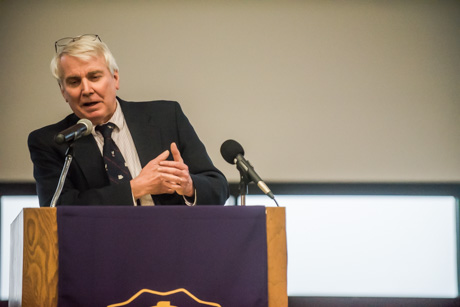D&C investigative reporter recalls the day he saw true justice correct an injustice in a Rochester courtroom

While everybody has their own view of what justice looks like, Gary Craig, an investigative reporter for the Democrat and Chronicle recalled a 20-year-old story at Genesee Community College on Wednesday night that illustrated what justice looks like to him.
Craig was the keynote speaker for the Paralegal Honor Society at their second annual Law Day observance.
The theme of Law Day this year is "Free Speech, Free Press, Free Society" and but Craig said he wanted to talk about justice.
He recalled the case of Betty Tyson, who was wrongfully convicted in the 1973 of murder.
A traveling businessman visiting Rochester had been killed and police investigators decided Tyson did it.
Tyson always maintained that her confusion had been beat out of her. Two witnesses, cross-dressing teens, testified against her and said they witnessed the murder. There was no physical evidence. In fact, tire tracks at the scene did not match Tyson's car.
The investigator was eventually convicted in another case of beating a suspect.
In 1996, a source pointed Craig to one of the young men who had testified against Tyson. Over several months, Craig won the man's trust and the man eventually admitted, for publication, that he lied on the stand.
During his investigation, Craig also found a sworn statement by a visiting nurse that hadn't previously been made public. The nurse had visited Tyson shortly after her arrest and reported that she was covered with cuts and bruises.
An attorney, Jon Getz, read Craig's stories and agreed to represent Tyson at no charge to the family (after, Craig said, several other attorneys had taken advantage of the Tyson family). He filed a motion to overturn the conviction based on new evidence.
During preparation for the case, the District Attorney's office found a previously undisclosed statement from the other teen witness taken immediately after the murder. That teen, who was dead by 1996, said initially, that he saw nothing. In 1973, that statement hadn't even been disclosed to the prosecutor. The teen, of course, later changed his testimony, and apparently because he had been intimidated, as a cross-dressing teen in the 1970s, by the investigator.
This was a high-profile, politically charged case, Craig said. The DA, the judge, all had ample reason to not share the new discovery with the defense. The judge could easily have ruled differently.
He didn't.
Craig was in court when the judge handed down his decision.
"I get emotional talking because I have such respect for the system," Craig said. "In that moment, in that courtroom, I literally had chills because I felt that I was watching this pure definition of justice, unadulterated justice right in front of me, where everybody was seeking to do what they should do, what you would hope they would do all the time, and most people do.
"But there was this harmonic convergence, to use an old term, in that courtroom where I felt in my heart that, 'wow, you know I'm really beholding something. I'm watching something special right now.' "
Craig is author of the 2017 book "Seven Million: A Cop, a Priest, a Soldier for the IRA, and the Still-Unsolved Rochester Brink's Heist."
